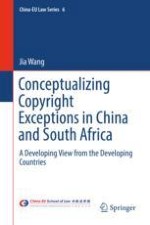This book critically evaluates the current copyright law system in a digital environment from a comparative perspective. Since many developing countries modelled their copyright laws on more advanced jurisdictions, they have not benefitted from such a law as much as intended due to their inherently embedded social economic conditions. Moreover, the copyright law system has been under constant challenges from rapidly developing digital technology and the Internet. All in all, there is a pressing need for developing countries to reevaluate their copyright law in light of their national needs, the developmental stage of their economy, their culture and tradition, and their legal system.
The book poses the question of whether copyright law should be reformed to fulfill its fundamental purpose of serving education and research that are in the public interest in the digital era? It examines whether the legal frameworks adequately address developing countries’ educational and research requirements in view of the opportunities and restrictions posed by electronic communication media. Further, it provides a comprehensive study that addresses the various critical issues relevant to the reform of the copyright law system and offers recommendations for developing countries to revamp their copyright law system to better serve their education and research sector.
